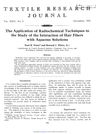 11 citations,
September 2012 in “The journal of investigative dermatology/Journal of investigative dermatology”
11 citations,
September 2012 in “The journal of investigative dermatology/Journal of investigative dermatology” A mutation in the KRT71 gene causes a hair disorder by disrupting hair follicle structure and texture.
 9 citations,
May 2021 in “Molecules”
9 citations,
May 2021 in “Molecules” New indole-based compounds, particularly cemtirestat, show promise as dual-function drugs for diabetic complications.
 4 citations,
January 2021 in “Skin appendage disorders”
4 citations,
January 2021 in “Skin appendage disorders” Hair straightening can damage hair and pose health risks, including exposure to carcinogens and hair loss.

research Acne
4 citations,
January 2019 Acne is a common skin condition that can be influenced by diet, lifestyle, and hormones, and requires a treatment approach that includes psychological considerations.
 1 citations,
March 2023 in “PloS one”
1 citations,
March 2023 in “PloS one” Different amounts of daylight affect cashmere growth in goats by changing the activity of certain genes and molecules.
 1 citations,
February 2021 in “Animal feed science and technology”
1 citations,
February 2021 in “Animal feed science and technology” Organic selenium may offer better retention and less waste in puppies.
 December 2024 in “Biomedical & Pharmacology Journal”
December 2024 in “Biomedical & Pharmacology Journal” Hair Tonic A, with white tea extract, is better for improving hair health.
 April 2024 in “BMB Reports”
April 2024 in “BMB Reports” Lack of Cisd2 disrupts calcium balance in cells, leading to poorly functioning neutrophils.
 January 2017 in “Elsevier eBooks”
January 2017 in “Elsevier eBooks” The Christ’s Thorn Jujube tree has many uses, including medicine, food, and industry, due to its beneficial properties.
 125 citations,
December 2016 in “Molecules”
125 citations,
December 2016 in “Molecules” Substances from Chinese medicines show promise for immune support and disease prevention, but the way they are processed affects their effectiveness.
 14 citations,
September 1954 in “Textile Research Journal”
14 citations,
September 1954 in “Textile Research Journal” Hair absorbs different substances from solutions based on pH levels.
 12 citations,
January 2014 in “Cell structure and function”
12 citations,
January 2014 in “Cell structure and function” Different combinations of human hair keratins affect how hair fibers form.
22 citations,
August 2015 in “PloS one” Keratin from hair binds well to gold and BMP-2, useful for bone repair.
 18 citations,
June 2019 in “Clinical research in dermatology”
18 citations,
June 2019 in “Clinical research in dermatology” Acne can't be cured but can be managed with treatments like benzoyl peroxide and diet changes; it's costly and can lead to scarring and mental health issues.
May 2024 in “Molecules/Molecules online/Molecules annual” Plant extracts can help prevent hair loss and promote hair growth.
November 2020 in “IntechOpen eBooks” Not getting enough minerals can lead to health problems and shorter lifespans.
 3 citations,
November 2021 in “Applied Microscopy”
3 citations,
November 2021 in “Applied Microscopy” Hair microscopy is a simple and cost-effective method to help diagnose systemic diseases in children.
 June 2024 in “Molecules/Molecules online/Molecules annual”
June 2024 in “Molecules/Molecules online/Molecules annual” Platycladus orientalis flavonoids protect balding hair from UV damage and slow hair color change.
 May 2024 in “Biochemical pharmacology”
May 2024 in “Biochemical pharmacology” Blocking CISD1 reduces hearing loss from cisplatin in mice.
 August 2024 in “Cosmetics”
August 2024 in “Cosmetics” K18® and Olaplex® both effectively repair bleached hair, improving its strength, smoothness, and overall health.
February 2022 in “Fibers” Scientists created a non-toxic, sugar-based hair product that can style hair without damage.
 1 citations,
August 2023 in “Journal of cosmetic dermatology (Print)”
1 citations,
August 2023 in “Journal of cosmetic dermatology (Print)” Too much selenium can cause hair loss and nail problems.
5 citations,
September 2018 in “International journal of genomics” Genetic mutations that disrupt homocysteine breakdown lead to increased damage in mouse hair keratin.
3 citations,
July 2023 in “Cells” MG53 helps reduce skin damage caused by nitrogen mustard.
3 citations,
July 2023 in “Acta Biomaterialia” PepACS offers a safer, eco-friendly way to perm, dye, and repair hair.
20 citations,
December 2021 in “Plants” Tamarix aphylla may be effective for various medical conditions, but more research is needed to confirm its safety and effectiveness.
2 citations,
October 2023 in “Biology” Cobalt is important for health but too much or too little can cause health problems, and its environmental buildup is a concern.
February 2025 in “Biomimetics” The shampoo straightens hair while keeping it healthy and less damaged.
 September 2023 in “Journal of Natural Fibers”
September 2023 in “Journal of Natural Fibers” Drying hair with a microfiber towel better maintains hair strength and structure than using a cotton towel or blow-drier.
 11 citations,
February 2018 in “Amino acids”
11 citations,
February 2018 in “Amino acids” Copper and iron cause keratin damage in hair by converting methionine to homocysteine.




















